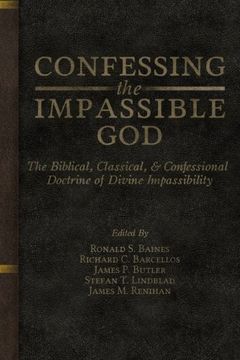Compartir
Confessing the Impassible God: The Biblical, Classical, & Confessional Doctrine of Divine Impassibility (en Inglés)
Ronald S. Baines
(Autor)
·
Richard C. Barcellos
(Ilustrado por)
·
Rbap
· Tapa Blanda
Confessing the Impassible God: The Biblical, Classical, & Confessional Doctrine of Divine Impassibility (en Inglés) - Barcellos, Richard C. ; Baines, Ronald S.
$ 15.99
$ 19.99
Ahorras: $ 4.00
Elige la lista en la que quieres agregar tu producto o crea una nueva lista
✓ Producto agregado correctamente a la lista de deseos.
Ir a Mis ListasSe enviará desde nuestra bodega entre el
Miércoles 12 de Junio y el
Jueves 13 de Junio.
Lo recibirás en cualquier lugar de Estados Unidos entre 1 y 3 días hábiles luego del envío.
Reseña del libro "Confessing the Impassible God: The Biblical, Classical, & Confessional Doctrine of Divine Impassibility (en Inglés)"
The book is structured as follows. The Introduction presses home the importance of the doctrine of divine impassibility. Readers will be challenged to recognize that tinkering with divine impassibility as classically understood has implications that always end up compromising other fundamental articles of the Christian faith. The main argument is contained in seven parts. Part I addresses vital issues of prolegomena. Prior to providing a positive explication of the doctrine, we outline our theological method. Chapter 1 discusses the theological grammar of the doctrine of divine impassibility. Important concepts such as biblical metaphysics, act and potency, and the analogy of being are discussed. These are basic and crucial concepts to understand at the outset. Chapter 2 offers an introduction to the hermeneutical method employed throughout. These two chapters together reflect our commitment to the traditional language of classical theism and the hermeneutics of the Reformed tradition as articulated in the English Reformed Confessions of the sixteenth and seventeenth centuries. As readers will become aware in reading the subsequent sections, the issue of method is crucial and foundational in this discussion. Part II (chapters 3-7) covers the Old and New Testaments. Though all potential passages of Scripture are not discussed, the most important texts on the subject of divine impassibility are addressed. The order of these chapters reflects our hermeneutical method: we consider texts on the nature of God first, texts which speak of immutability and impassibility next, concluding with those texts that appear to indicate some sort of passibility in God. Each testamental section ends with a brief conclusion. Part III (chapters 8-9) surveys the history of the doctrine of divine impassibility. We seek to demonstrate that what was once a catholic doctrine has become muddied as scholars of various theological traditions have reformulated, modified, and in some instances rejected classical theism's commitment to divine impassibility. Part IV (chapters 10-12) offers a systematic-theological approach to the subject. It assumes Parts I-III and builds upon them. Careful discussion is provided on such issues as the relationship of divine impassibility to the essence and attributes of God, the divine affections, and the incarnation of the Son of God. Our goal is for readers to realize the significance of divine impassibility in relation to many other essential doctrines of the Christian faith. It is part of the system of doctrine contained in our Confession; tinkering with impassibility has far-reaching ramifications. Part V (chapter 13) offers an overview of the doctrine of divine impassibility as contained in the Second London Confession of Faith (1677/89). This confessional document asserts the same doctrine as the Westminster Confession of Faith (1647) and the Savoy Declaration (1658) on the issue of divine impassibility. The place of the doctrine in the Confession as well as its relationship to other confessed truths is presented. Part VI (chapter 14) seeks to explicate the practical theology of divine impassibility. It draws out implications of the doctrine under the topics the saving knowledge of God, the Christian life, worship, and pastoral ministry. Part VII (chapter 15) offers closing comments and a list of affirmations and denials in light of the entire study. Additionally, we have included two appendices, containing book reviews of contemporary attempts to modify the classical doctrine of divine impassibility. Foreword by Paul Helm. Endorsements by James Dolezal, J. V. Fesko, Ryan McGraw, and Fred Sanders.

